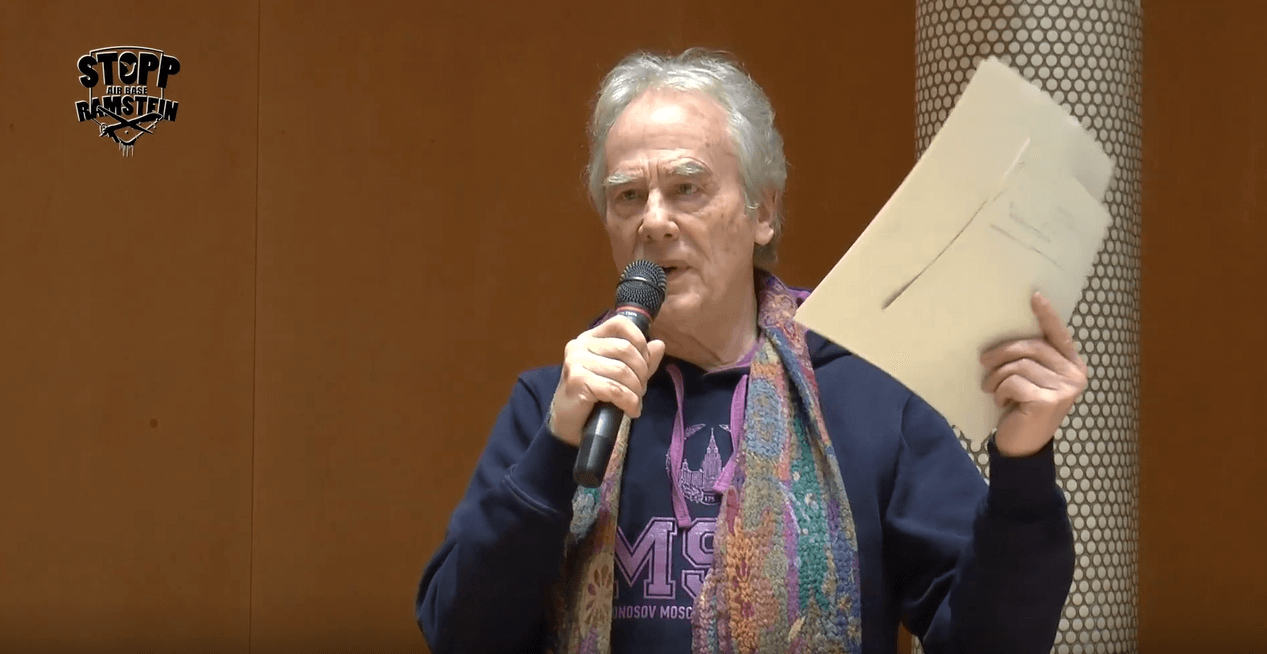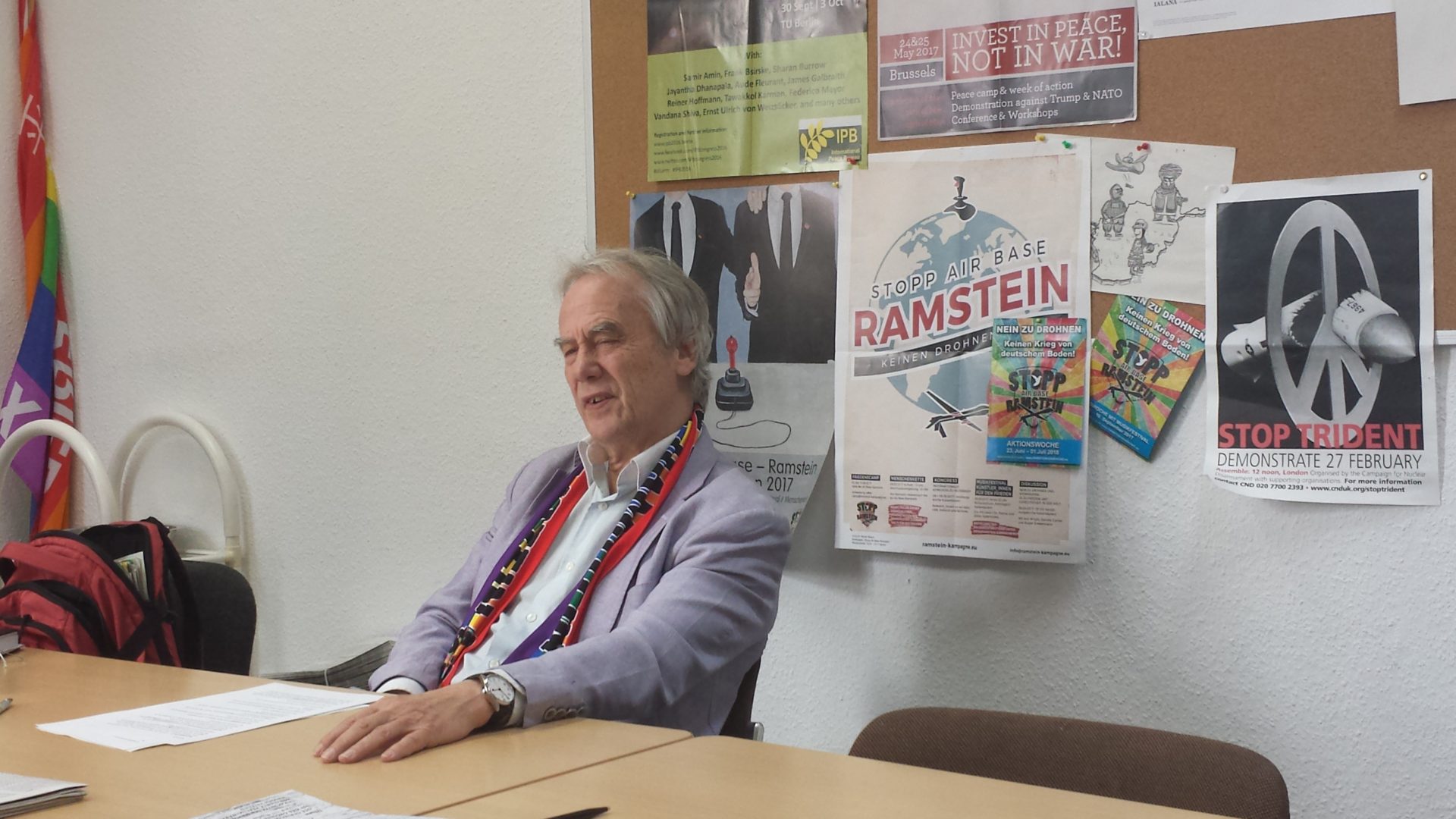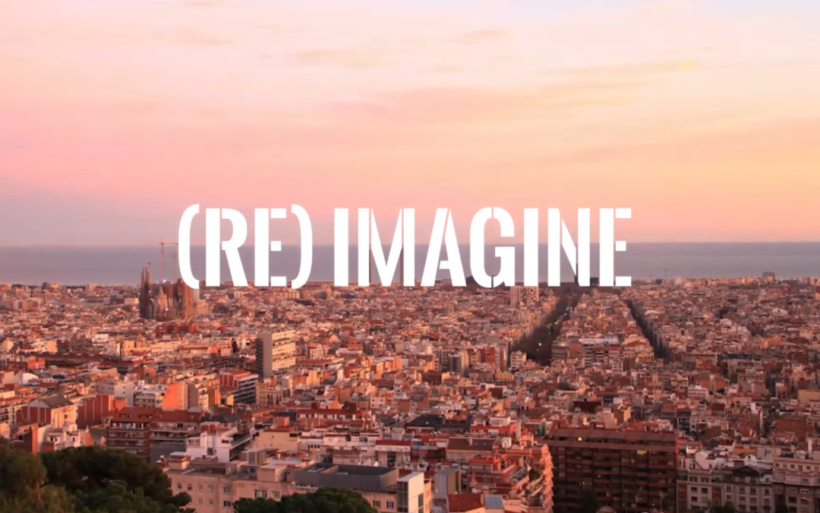A few days before the IPB World Peace Congress 2021 in Barcelona, we talked to Reiner Braun, Executive Director of the International Peace Bureau (IPB) about how the peace movement, trade unions and the environmental movement can come together, why we need a peace congress of encouragement and youth, which will take place completely hybrid from 15-17 October in Barcelona and why it is exactly the right moment for it.
Reto Thumiger: Thank you for taking time for an interview, dear Reiner.
Your decades of tireless commitment to peace have made you a well-known figure in the peace movement. Since I hope that many people who are not yet peace activists will read this interview, I ask you to introduce yourself briefly.
Reiner Braun: I have been involved in shaping the peace movement nationally and internationally for a good 40 years, in very different positions of responsibility: as a staff member of the Krefeld Appeal in the 1980s, as Executive Director of the Natural Scientists for Peace, later of IALANA (Lawyers Against Nuclear Weapons) and the VDW (Association of German Scientists). In the last few years I was first President and then Executive Director of the IPB (International Peace Bureau) until today. What has always been particularly important for me is that I have been active in campaigns against nuclear weapons, for the “Stop Ramstein Air Base” and in the campaign “Disarm instead of Rearm”. I had the great pleasure to be part of hundreds maybe even thousands of small actions and activities but also the big highlights; the demonstrations in Bonn, against the Iraq war, at Artists for Peace but also at the actions of the World Social Forum. In summary, peace has had a decisive influence on my life. Despite all the difficulties, problems and controversies, they were great years with incredibly interesting people and a lot of solidarity and passion. This does not change my conviction that the current situation is not only dangerous but also deeply depressing. Are we not possibly living in the pre-war era of a new great war with nuclear weapons emanating from the Indo-Pacific region?
We have enough proposals to save the world
The IPB World Peace Congress, taking place in Barcelona from 15 – 17 October, follows on from the Congress of the same name held in Berlin in 2016, which was very successful. A lot has happened in the 5 years. What are the focal points this time, what goals and hopes do you associate with the congress?
The world is at a fundamental crossroads: sliding into social and ecological catastrophe with the politics of confrontation and war, or finding the way out, which I would describe as a fundamental social-ecological peace transformation. Helping to find ways out of this situation is the great goal of the IPB World Congress. It is about the great challenges of our time. It is not about the 100th strategy paper – we have enough proposals to save the world. It is more about the subjects of change as well as their coalition building and more and internationally networked actions. People shape history: that is what this congress is meant to contribute to and encourage. How can the peace movement and trade unions, the environmental movement, and peace come together? What are new approaches of new activists from Fridays for Future to the peace movement, without instrumentalizing it and distracting from their own causal concerns? These are questions that the congress wants to answer together with all those involved in the various movements.
Real internationality and diversity should characterize it. Asia, the “future continent” and perhaps I should also say “war continent” of the future with even bigger wars will shape it thematically. NATO’s confrontation with Russia, small arms and Latin America, the peace consequences of the pandemic, but also Australia and the new nuclear submarines, just a few central points.
How can the dream of a peaceful and just world become reality?

Gender challenges, the particular oppression of indigenous peoples – issues that also always have to do with war and peace.
Of course, the demands for disarmament, a world without nuclear weapons, peaceful conflict resolution and peace education are important components of the World Congress. But everything is subordinated to the thought of the song “Imagine” by John Lennon: how can the dream of a peaceful and just world become reality. What can we all, together, do for this, wherever we come from, whatever we think, whatever has shaped our lives so far. We need to come together in more, bigger and international actions for the future – to leave the lethargy, the observer status.
This is probably where the motto of the Forum comes in: “(Re)imagine our world: Action for Peace and Justice”: Action for Peace and Justice”?
Yes, this motto is meant to remind, to evoke visions and to call for action: You alone may be too weak, together we can do it. It is not pre-programmed that corporations and governing politics drive us into the abyss. It is therefore also a congress of encouragement without, however, having any illusions about how hard the struggles will be and of youth. Not only do we have independently designed diverse activities of the IPB youth at the congress, but also 40% of all speakers are under 40.
Hybrid participation is possible up to the last minute and Barcelona is always worth the trip.
The 2400 online and offline registrations from 114 countries so far give us courage and confidence that we are at least close to our goals.
All details of the program, its diversity and plurality, its internationality and its competence can be found on the website. There you will also find detailed descriptions of the almost 50 workshops, the fringe events, the cultural events and an invitation to the MacBride Award Ceremony on Saturday evening. It’s really worth taking a look at all this, and I can imagine that some of you will say: I’d like to be there too. Hybrid is possible up to the last minute. Barcelona is always worth a trip and joining us online will certainly bring new insights and perhaps also a little new strength for peace.
Without overcoming capitalism, we will achieve neither peace nor global and climate justice
If the last few years have taught us anything, it is that the big problems, the big threats to humanity, are very complex, interconnected and individual countries or regions are powerless against them. This means that we need coherent approaches to solutions and international cooperation. What we are experiencing is absurdly the opposite.
Unfortunately, thinking in complexity, in interconnections and, I would add, in dialectics has often been lost in favour of black-and-white simplification and fact-resistant simplification. Politically, this approach is also deliberately used to negate the dimension of the challenges and to demand a continuation of so-called reforms. What we actually need is a – I know it is out of fashion to use the word – is a revolution: a fundamental and, I would add, democratically participatory transformation of all relations of domination, power and property, including a completely new relationship with nature. It sounds like a slogan now, but that’s how interviews are: without overcoming capitalism, we will achieve neither peace nor global and climate justice. Jean Jaures already formulated this uniquely for peace in 1914, when he emphasized that capitalism carries war within itself, like the cloud carries the rain. We will not solve the climate challenge without rethinking the growth ideology and this fundamentally contradicts the capitalist accumulation necessities and profit interests and nobody should believe that we can have global! justice without going to the very foundations of corporate power and exploitation.
“I am convinced that the changes must and will be much deeper, more fundamental, more basic.”
So what we need now and immediately is cooperation, a policy of common security – this is the declaration of war on Biden and NATO – because only then, can we open ways to build a peaceful, ecological future.
Personally, however, I am deeply convinced that the changes must and will be much deeper, more fundamental, more fundamental. The discussion about this is certainly absolutely necessary, but it must not prevent us from taking urgently needed first steps, measures and actions together, especially with the many who do not share my position. A discussion without exclusion and taboos, but with a lot of understanding for the other is necessary if we want to achieve a fundamental transformation in a participatory way and thus make peace more secure.
“We must quickly overcome the isolation that has arisen as a result of the Corona crisis in favor of solidarity-based action.”
In Europe, we are facing a possible end to the pandemic, while other parts of the world are still in the middle of it. Is this the right moment for an international peace congress?
We know quite well how big the challenges for this Congress have been under Corona conditions during the whole period of preparation. Let me be clear: there is no better time, not only because such a world congress is politically absolutely necessary. The more important reason is that we urgently need to overcome, very quickly and in solidarity, the isolation that has arisen as a result of the Corona crisis in favor of solidarity actions. We have to go back to the streets and squares. Digitally, we have moved together, now this must also become more politically visible. After 18 months of pandemic containment, there is a really huge interest in meeting and exchanging ideas, and even in embracing and greeting each other again. We need this empathy. I hope it will spread a little to all those who will be participating online. We need an atmosphere of new beginnings and I hope the congress will contribute to this.
Lula, Vandana Shiva, Jeremy Corbyn, Beatrice Finn and many more….
The Congress is certainly an experiment in its many hybrid forms, but a meaningful and hopeful one. I am quite convinced that hybrid formats will be the concept of the future. They enable comprehensive international networking.
Some big names have been announced in the program. Who do you expect in person or via video link?
All the “celebrities” announced in the program will be present, either hybrid like former President Lula or Vandana Shiva, others like Jeremy Corbyn or Beatrice Finn we will be able to welcome on site. The central speakers of the plenary papers on Saturday and Sunday will be present. For the workshops, it will be divided. Highly interesting ones like the one on AUKUS will be online, the workshops on nuclear weapons or common security in presence/hybrid.
There will certainly be enough opportunities for exchange and discussion. Not to forget the public rally with all participants of the opening event, where we will form the peace sign with our mobile phones.
For fundamental changes, not only outstanding personalities are needed, but all of us are challenged. Why should an activist whose activities are not focused on peace or a person who is not socially or politically active take part in the congress?
Already when registering for the congress, we noticed the diversity of the participants. Diverse because they really come from different parts of the world, but also diverse in their commitment. They all share the basic ideas of the great social-ecological peace transformation. Peace is unthinkable without global justice and climate justice, and there will be no climate justice without an end to wars and armed conflicts. These are 2 sides of the same coin. We want to deepen these thoughts and make them more actionable. We want to make clear that relations of nature are also always relations of domination and power, which must be overcome or democratized and shaped in a participatory way in and for peace.
What are the possibilities for participation (on site and online), which languages are supported? And above all, what opportunities are there for active participation?
Independent design is the challenge for online design. We have acquired a technical system for this that allows individual discussion, the development of small groups, the presentation of posters and documents, and even individual exchange. This is certainly not what the participants will experience on site – even and especially besides the official program, but it creates a lot of space for communication. The main languages will be English, Catalan and Spanish. But in case of doubt, women and men can also communicate with hands and feet.
The congress itself is a communicative network meeting and everyone will go home with many new impressions and experiences – I am quite sure of that.
“I am not a “passive sacrificial lamb” of others”

Reiner Braun Archive photo by C. Stiller
Now, finally, a personal question for you. How do you manage to maintain your commitment and confidence in these times? What gives you hope?
Confidence and optimism come from my deep conviction that people write history and that history can be influenced and even determined by the actions of people. I want to participate in this and not be a “passive sacrificial lamb” of others. I feel part of a worldwide community of solidarity – which is also allowed to argue – that wants to achieve a better, peaceful, and just world. In my life, I have experienced so much solidarity and togetherness in the diverse actions, met many people who have walked upright under the most difficult conditions – this has influenced and also shaped me.
This feeling of solidarity, this understanding of a community of people who think and act in a similar way does not make setbacks or painful political defeats easy but more bearable, it gives hope and a compass for the future even in signs of great difficulties and uncertainty.
I just can’t let it go either, giving up is not an option, because I can’t and won’t give up on myself. Dignity – especially in difficulties, conflicts and defeat I have always admired and make successes all the more valuable.
Capitalism is not the end of the story for me. Compared to billions of other people on this planet, I am still in a privileged situation and I would like to give a little of that away and make sure that others also live better and that the environment is preserved. Peace with nature is also a personal challenge.
What better thing can I do than to work together with many for a better life, for justice and peace. That makes me happy too.
Click here to register: https://www.ipb2021.barcelona/register/
Pressenza is running a workshop on non-violent journalism on Saturday 16 October from 11:30 – 12:00.






